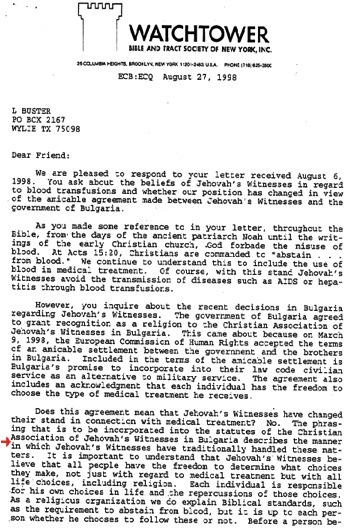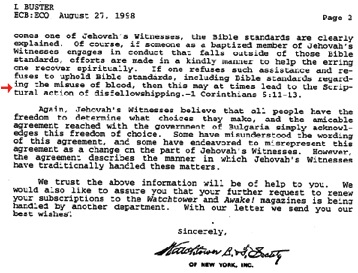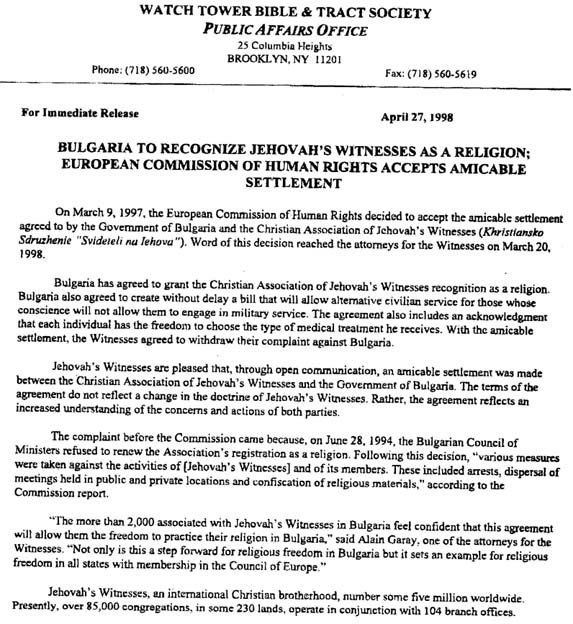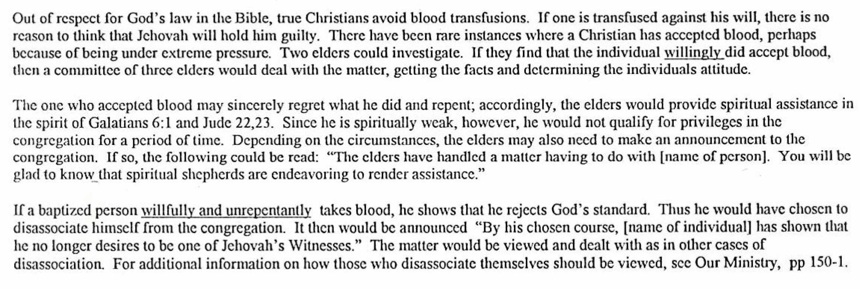Bulgaria, the Watchtower and Blood Transfusions
In order to gain legal recognition in Bulgaria during the 1990's, the Watchtower was required to change its doctrine on military service, and allowed civilian service in 1996. It also signed a document before the European Commission on Human Rights, deceptively stating it does not sanction followers for taking blood transfusions.
The situation regarding the Watchtower Society and blood transfusions in Bulgaria demonstrates that the Watchtower is prepared to bend the truth in furthering its own political needs. It is hard to reconcile how Watchtower actions before the European Commission on Human Rights could be construed as anything other than perjury.
On June 28, 1994, the Bulgarian Council of Ministers refused to renew the Watchtower’s registration as a religion.1 The two main issues behind this decision were Watchtower doctrine forbidding:
- Witnesses to participate in military service
- Witnesses and their children to receive blood transfusions
A four-year legal battle ensued, resulting in compromise on both sides. The Watchtower Society and government of Bulgaria brokered an agreement through the European Commission of Human Rights that was adopted on March 9th 1998 under Application No. 28626/95. This states in part:
16. By letters of 8 and 12 September 1997 the parties indicated their willingness to reach a friendly settlement. The parties exchanged correspondence and proposals for a friendly settlement and held meetings in Sofia on 20 and 21 November 1997. On 17 January 1998, upon the parties' request, the Commission made proposals to the parties with a view to resolving some remaining differences in their positions. The parties again met in Sofia on 10 February 1998.
17. By letters of 10 and 11 February 1998 the parties informed the Commission of the final text of the friendly settlement.
Click here to read the full document
The Watchtower reached a “friendly settlement” by indicating a change to its rules regarding blood transfusions and military service. In order to accommodate the wishes of the Watchtower Society, the Bulgarian government created a non-combative military service option for conscientious objectors to participate in.
If only it were that simple. Scratch beneath the surface and a raft of issues become apparent, highlighting the Watchtower’s willingness for deception in what is an example of “theocratic warfare”.
“It is proper to cover over our arrangements for the work that God commands us to do. If the wolfish foes draw wrong conclusions from our maneuvers to outwit them, no harm has been done to them by the harmless sheep, innocent in their motives as doves.” Watchtower 1956 Feb 1 p.86
Military Service
Bulgaria had an issue with the Watchtower’s refusal to participate in military service. For many decades, Witnesses were not allowed to engage in military service. Not only was combative military service disallowed, also non-combative or civilian service was also forbidden. Many young witnesses around the globe were jailed for such a stance, some for years.
"Jehovah’s witnesses are according to God’s Word no part of this world which is governed by the political systems. For this important Bible reason they tell officials of the government that they conscientiously object to serving in any military establishment or any civilian arrangement that substitutes for military service." Watchtower 1951 Feb 1 p.77
"An examination of the historical facts shows that not only have Jehovah's Witnesses refused to put on military uniforms and take up arms but, during the past half century and more, they have also declined to do noncombatant service or to accept other work assignments as a substitute for military service. … Many of Jehovah's Witnesses have been imprisoned because they would not violate their Christian neutrality." United in Worship of the Only True God p.167
"Before 1977 the [Greek] brothers would be called to serve prison sentences repeatedly; some spent over 12 years in prison!" Yearbook 1994 p.108
Other Witnesses, such as in Mexico, have been permitted by the Watchtower to bribe officials to receive documentation dishonestly claiming they had completed military service. See Malawi vs Mexico
To settle the dispute in Bulgaria, compromise was required on both sides. To accommodate the conscience of Watchtower followers, the Bulgarian government introduced civilian service into their military service program. In 1996, the Watchtower conveniently changed its stance on military service, allowing non-combative or civilian service.
"What, though, if the State requires a Christian for a period of time to perform civilian service that is a part of national service under a civilian administration? … That is his decision before Jehovah. Appointed elders and others should fully respect the conscience of the brother and continue to regard him as a Christian in good standing. " Watchtower 1996 May 1 pp.20,21
This change in policy seems somehow disappointing after the hardship young Witness men endured for decades. By determining that civilian service was not actually an important issue before Jehovah, Watchtower leaders showed Bible interpretation can be shaped by governmental requirements as readily as by holy spirit.
Blood Transfusions
The other issue of importance to the Bulgarian government was that Jehovah's Witnesses could be disfellowshipped for taking a blood transfusion.
"Beginning in 1961 any who ignored the divine requirement, accepted blood transfusions, and manifested an unrepentant attitude were disfellowshipped from the congregations of Jehovah's Witnesses." Jehovah's Witnesses - Proclaimers of God's Kingdom pp.183-184
The authorities felt Witnesses should not be coerced to forgo life saving treatment at the threat of being disfellowshipped. For Jehovah's Witnesses to be recognised as a religious organization in Bulgaria, the Watchtower Society had to ensure that, regarding blood transfusions, "members should have free choice in the matter for themselves and their children, without any control or sanction on the part of the association."2
As part of the reconciliation, the Watchtower agreed that they would not sanction the use of medical treatment for Witnesses.
“2.1 - Jehovah's Witness patients resort to the use of the medical system for themselves and their children; each member having the right to make use of this [medical system] freely at their own discretion, without any controls or sanctions on the part of the petitioner;” - Translation of Application No. 28626/95
Watchtower representatives publicly announced that though they continue to highlight Bibles principles regarding the requirement to abstain from using blood, they do not prevent followers from taking blood. In a Watchtower press release of April 27th 1998, they stated:
“The agreement also includes an acknowledgment that each individual has the freedom to choose the type of medical treatment he receives. …. The terms of the agreement do not reflect a change in the doctrine of Jehovah’s Witnesses.”
This is far from true in two regards.
- We have already seen that there was a doctrinal change to allow Witnesses the right to engage in civilian military service.
- As will be discussed later, individuals do not have “freedom to choose” a blood transfusion if they are to remain Witnesses.
Finnish journalist Pasi Turunen writes that in an interview in Finland on a local Christian radio station in April 1998 a Watchtower representative made the following comment:
"...this deal by Bulgaria is such that when the European human-rights court gave two weeks ago a decision, that the Bulgarian government must register Jehovah's Witnesses, that Jehovah's Witnesses cannot be classified as a destructive sect or religion, so Jehovah's Witnesses do not tell what a particular individual does, so this deal means this, that every individual has a full freedom of conscience to do, and Jehovah's Witnesses do not tell in a centralized way what someone does or does not do. And that's what that deal means."
It seemed that a dramatic shift in policy had occurred. In reality nothing had changed, as Watchtower’s policies and procedures remained virtually the same. The words conveyed by the Watchtower representatives are deceptive, as Witnesses are subject to identical repercussions if they have a blood transfusion or allow their children to have one.
Following the Watchtower’s agreement with Bulgaria, blood transfusions were removed from being a disfellowshipping offence. This was of little consequence, as the consumption of blood was simply reclassified from being a disfellowshipping offence to one of disassociation. This change was released as a letter to Traveling Overseers dated: 4/26/00: For KS/91 page 95 – Blood Issue. 5/21/00: New procedure for handling cases where ones take a blood transfusion.
The 2001 Notification of Disfellowshipping or Disassociation form (S-77-E 7/01) included the use of blood under the disassociation check box.

Notification of Disfellowshipping or Disassociation form S-77-E 6/14 (2014) continues in the same manner.

Shepherd the Flock of God, the 2010 release of the Elder's manual, detailed that taking blood can lead to disassociation.
"Willingly and unrepentantly taking blood.
If someone willingly takes blood, perhaps because of being under extreme pressure, the committee should obtain the facts and determine the individual's attitude. If he is repentant, the committee would provide spiritual assistance in the spirit of Galatians 6:1 and Jude 22,23. Since he is spiritually weak, he would not qualify for special privileges for a period of time, and it may be necessary to remove certain basic privileges. Depending on the circumstances, the committee may also need to arrange for an announcement to the congregation: "The elders have handled a matter having to do with [name of person]. You will be glad to know that spiritual shepherds are endeavoring to render assistance." On the other hand, if the elders on the committee determine that he is unrepentant, they should announce his disassociation." Shepherd the Flock of God pp.111-112
In Correspondence Guidelines, outlines that three elders investigate and disassociate, but that this is not a "judicial committee".
"A baptized person who willfully and unrepentantly takes a blood transfusion thereby chooses to reject the Scriptural sanctity of blood and violates God’s law. Three elders (not a judicial committee) should examine the facts. If they determine that he has accepted a blood transfusion without repentance, the congregation will consider him as having disassociated himself." Correspondence Guidelines (2007) p.25
This is a sly play on words, and the different procedures between being disfellowshipped and disassociated have resulted in Jehovah's Witnesses being disadvantaged by this change. With disfellowshipping, a committee is formed where the accused can plead and then appeal their case. With disassociation, the person is considered to have chosen to remove themselves from the congregation by their actions, and hence have no right of appeal to the decision.
Despite the subtle difference in procedure, disfellowshipping and disassociation lead to the same announcement to the congregation, that the person is "no longer one of Jehovah's Witnesses" and, as shown in Pay Attention to Yourselves and All the Flock pp.102-103, the same treatment.


It is important to recognise that both result in shunning.
People that enquired to Watchtower headquarters about the Bulgarian changes have received explanations such as the following.


The cunning wordplay is a shocking indication of the lack of respect Watchtower leaders hold for governments of the world. Whilst the Watchtower signed in the European Commission of Human Rights application that a Witness could act “freely at their own discretion, without any controls or sanctions ”, the above letter shows there are repercussions that are highly persuasive in preventing Witnesses from exercising their own freedom and discretion.
The Watchtower may not prevent members from taking blood, such as by physical restraint, but they are doctrinally prevented and as a result emotionally prevented, by threats of shunning and death at Armageddon. When blood is required, elders will discuss and pray with the patient to be strong in their resolve to reject blood, fill in legal paperwork for the patient and reason with doctors. On occasions, elders will even provide a 24-hour watch to ensure a member does not receive blood. If, despite all this pressure to comply with Watchtower doctrine, the Witness does accept blood, they face the sanction of disassociation and eternal death.

“Pay Attention to Yourselves and to All the Flock” p.21

“Pay Attention to Yourselves and to All the Flock” p.22
“According to the law of Moses, which set forth shadows of things to come, the receiver of a blood transfusion must be cut off from God's people by excommunication or disfellowshiping. ... As a rebellious opposer and unfaithful example to fellow members of the Christian congregation he must be cut off therefrom by disfellowshiping.” Watchtower 1961 Jan 15 pp.63,64
“When one is near death is no time to tamper with or violate the law of God, but a time to draw as near as possible to God by remaining faithful. Everlasting life is the reward for faithfulness. How foolish it would be to gamble away the prospect of life eternal for the very uncertain promise of a cure by blood transfusion!" Watchtower 1970 Apr 15 p.249
Can it be said that a person has freedom to choose medical treatment if their religious leaders threatened them with shunning and the loss of life eternal? It would be like the taxation office saying you are free to refuse to pay tax, but when you are caught you will go to jail. That is not freedom. Furthermore, whilst the Watchtower may try to skirt around definitions of freedom, there certainly can be no doubt that it is a direct lie that Witnesses do not face “controls or sanctions” if they have blood.
In 2000 the Watchtower issued a press release stating that the requirements from Bulgaria had resulted in no changes in policy.

The Bulgarian government attempted to allow individual Witnesses the right to choose a blood transfusion, and the Watchtower gave the impression that they were changing their procedures on blood when signing Application No.28626/95. There can be no doubt that Bulgarian authorities felt this document meant they had paved the way for Witnesses to enjoy freedom of choice in regards to blood. Maybe the Bulgarian government was naïve in thinking a religion that prides itself on political neutrality would abide by political documents that it signed.
Although the term “theocratic warfare” is no longer used in Watchtower publications, the situation with Bulgaria shows the Watchtower Society still finds it acceptable to follow the principle of deceiving governments in furthering its own interests.
“Today God’s servants are engaged in a warfare, a spiritual, theocratic warfare, a warfare ordered by God against wicked spirit forces and against false teachings. God’s servants are sent forth as sheep among wolves and therefore need to exercise the extreme caution of serpents so as to protect properly the interests of God’s kingdom committed to them. At all times they must be very careful not to divulge any information to the enemy that he could use to hamper the preaching work.“ Watchtower 1957 May 1 pp.285-286
Footnote
1 For a full description of the claim by Bulgaria and counterclaim by the Watchtower Society see the Press Communique’ Application No. 28626/95
2 As quoted from Communiqué issued by the Secretary to the European Commission of Human Rights INFORMATION NOTE No. 148 on the 276th Session of the European Commission of Human Rights (Strasbourg, Monday 2 March - Friday 13 March 1998)
Written 2010. Latest update February 2022.
![]() Paul Grundy 2005 - 2026
Paul Grundy 2005 - 2026


